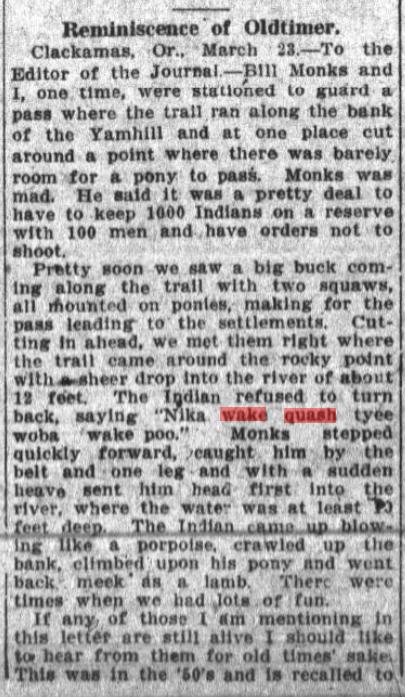1911 [1850s]: Yamhill oldtimer’s reminiscence
Early days on the Grand Ronde Indian Reservation, with a Chinuk Wawa quotation from a Native man.
The usual disclaimers about racial attitudes apply here.

Image credit: Willamette Valley Pleistocene
Read on, and I’ll help you with the Chinook Jargon after this article:


Reminiscence of Oldtimer.
Clackamas, Or., March 23 .- To the
Editor of the Journal. — Bill Monks and
I, one time, were stationed to guard a
pass where the trail ran along the bank
of the Yamhill and at one place cut
around a point where there was barely
room for a pony to pass. Monks was
mad. He said it was a pretty deal to
have to keep 1000 Indians on a reserve
with 100 men and have orders not to
shoot.Pretty soon we saw a big buck com-
ing along the trail with two squaws,
all mounted on ponies, making for the
pass leading to the settlements. Cut-
ting in ahead, we met them right where
the trail came around the rocky point
with a sheer drop into the river of about
12 feet. The Indian refused to turn
back, saying “Nika wake quash tyee
woba wake poo.” Monks stepped
quickly forward, caught him by the
belt and one leg and with a sudden
heave sent him head first into the
river, where the water was at least 10*
feet deep. The Indian came up blow-
ing like a porpoise, crawled up the
bank, climbed upon his pony and went
back meek as a lamb. There were
times when we had lots of fun.If any of those I am mentioning in
this letter are still alive I should like
to hear from them for old times’ sake
This was in the ’50’s and is recalled to
my mind by the proposal to move the
old Sheridan blockhouse to Dayton, Or.
I helped build that blockhouse.
WILLIAM MARFITT.
— from the the Portland (OR) Oregon daily journal of March 25, 1911, page 4, columns 5 & 6
“Nika wake quash tyee woba wake poo.”
= nayka wík k’wásh; táyí wáwa wík p’ú.
= I not afraid; chief say not shoot.
= ‘I’m not afraid; the boss said not to shoot.’
That spelling woba for wawa does not look to me like one of the usual mis-readings of a handwritten text by a typesetter. Instead, it may reflect local Native pronunciation habits. For me, it brings to mind how the place name we now know as Mulnomah used to be often written as Multnobah. Some Indigenous folks, particularly Chinookans, were known to alternate among w ~ m ~ b.

Masi, David. As always, much appreciated.
LikeLiked by 1 person